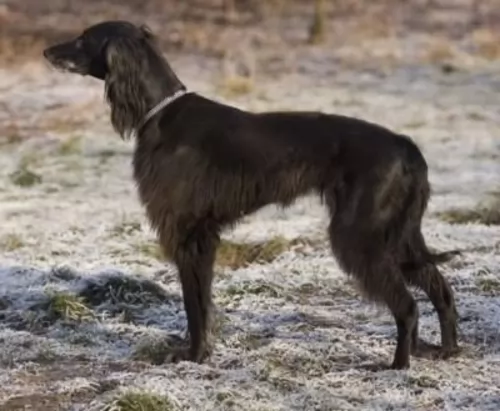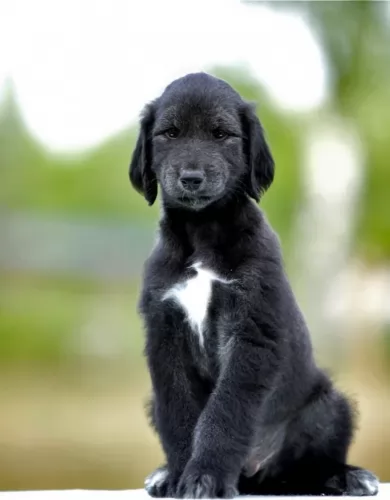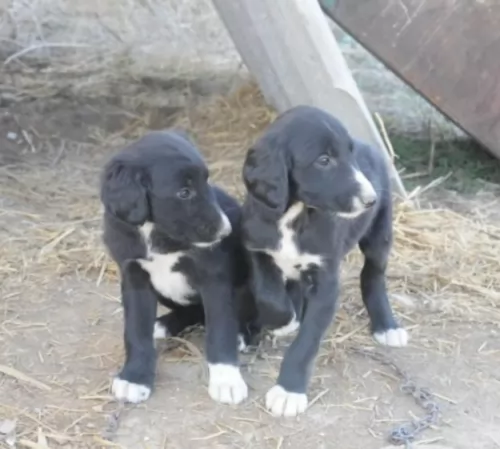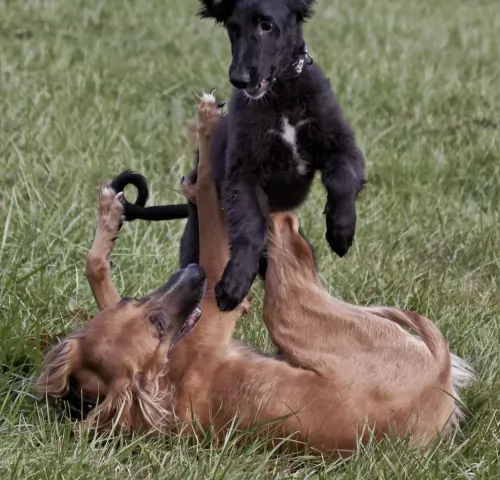 Petzlover
Petzlover Lakeland Terrier is originated from United Kingdom but Taigan is originated from Kyrgyzstan. Lakeland Terrier may grow 44 cm / 17 inches shorter than Taigan. Lakeland Terrier may weigh 26 kg / 57 pounds lesser than Taigan. Lakeland Terrier may live 3 years more than Taigan. Lakeland Terrier may have less litter size than Taigan. Lakeland Terrier requires Moderate Maintenance. But Taigan requires Low Maintenance
Lakeland Terrier is originated from United Kingdom but Taigan is originated from Kyrgyzstan. Lakeland Terrier may grow 44 cm / 17 inches shorter than Taigan. Lakeland Terrier may weigh 26 kg / 57 pounds lesser than Taigan. Lakeland Terrier may live 3 years more than Taigan. Lakeland Terrier may have less litter size than Taigan. Lakeland Terrier requires Moderate Maintenance. But Taigan requires Low Maintenance
 The Lakeland Terrier hails from the lake district of England. They were bred to hunt foxes that were coming after the lambs during lambing season.
The Lakeland Terrier hails from the lake district of England. They were bred to hunt foxes that were coming after the lambs during lambing season.
These dogs are connected to a number of terrier breeds such as the Bedlington-, Border-, Old English Black and Tan- as well as the Dandie Dinmont Terriers.
In 1921 the Lakeland Terrier Association was formed and the American Kennel Club registered a Lakeland in 1934.
 Known also as the Kyrgyzdyn Taighany, the Taigan is a sighthound dog from Kyrgyzstan. Today the dog is recognized by a number of kennel clubs,and more recently by the FCI.
Known also as the Kyrgyzdyn Taighany, the Taigan is a sighthound dog from Kyrgyzstan. Today the dog is recognized by a number of kennel clubs,and more recently by the FCI.
It was after 1991, when Kyrgyzstan became independent, that the role of the dog changed and t became a working dog again.
It was about in 1995 that a new breed standard was adopted, and since 2005 a national kennel club has existed in Kyrgyzstan.
 The Lakeland Terrier is a small to medium-sized dog which stands at between 33 – 38cm at the withers and weighs between 7 – 8kg.
The Lakeland Terrier is a small to medium-sized dog which stands at between 33 – 38cm at the withers and weighs between 7 – 8kg.
The head is rectangular and he has semi-erect, semi-floppy ears and a docked tail which is held up. These days you’ll find the Lakeland being left with a long tail, taking away that attractive, square, compact look. The crisp double coat can come in a number of colors such as tan, grizzle, black and tan together, a wheatish color with some red and white. The coat is regarded as being hypoallergenic.
Possessing a number of positive attributes, Lakies, a nickname of these jaunty little dogs, is a friendly, loving, bold, self-confident dog. You’ll find that he is also determined and strong-willed but training and socialization turns him into a more obedient dog. He then gets on well with everyone in the household as well as with other pets.
They are intelligent dogs, so it won’t be difficult training him when proper training methods are used.
He is adaptable too and will adapt to life in the city or in the countryside, so long as he is exercised regularly as they are excitable, energetic dogs.
 The Taigan is a large dog, looking much like a Grehound. He stands at between 55 and 82cm in height and weighs about 25 - 34kg.
The Taigan is a large dog, looking much like a Grehound. He stands at between 55 and 82cm in height and weighs about 25 - 34kg.
He has that typical slender body and slender head of the greyhound. The coat of the dog is medium length and somewhat curly and can be many colours, sometimes even bi-colored – cream, black and white, brown, grey or yellow.
During the Winter the coat can become long and thick. The ears are floppy and covered with wavy fur. The tail is long and a distinguishing mark of the dog is the way the end of the tail coils up into a ring.
These dogs can’t be kept in small city properties – they are used to wide open spaces.
An intelligent breed, the Taigan will readily learn some basic commands to make him well mannered and obedient. He is strong willed and independent, so it will be beneficial to have him trained.
He also makes a good watchdog. He is an even-tempered dog and he enjoys human companionship although he is somewhat reserved with strangers. Even so, he will still need a strong, firm owner as he is strong-willed and independent and likes to go his own way.
He is able to get along well with children in the home and other pets. Being a fairly large dog, and one that likes to run, he is better suited to large properties in the countryside as opposed to living in the city.
 It doesn’t matter that the Lakeland Terrier was bred to hunt and kill foxes in the Lake District of England because he is more than willing to settle down and become a loving and devoted pet too.
It doesn’t matter that the Lakeland Terrier was bred to hunt and kill foxes in the Lake District of England because he is more than willing to settle down and become a loving and devoted pet too.
He is a robust dog, known for his determination and courage. He is an energetic dog too so when you bring him into your home, be prepared to up your activity levels to cater for your energetic friend.
You can add good health to his list of positive attributes. He is a healthy dog breed with few health complaints to write about. Treat him well as every dog deserves and you can have him around for about 15, 16 or 17 years.
 The truth about any dog is that good nutrition, exercise and lots of love can contribute to ensuring a long, healthy life for your pet.
The truth about any dog is that good nutrition, exercise and lots of love can contribute to ensuring a long, healthy life for your pet.
Some health problems are inherited while others can be prevented simply by the kind of home you provide your pet with. Once you decide to bring a dog into your home, you need to do everything you can to ensure his wellbeing.
This is a joint problem which can see your pet limping or moving along in a skipping manner. You will need to see the vet because sometimes friction can lead to osteoarthritis, pain and lameness.
Eye problems such as cataracts and glaucoma can lead to blindness.
Terrier dogs are prone to allergies and dry, itchy skin can lead to other problems such as bacterial infections and be frustrating and stressful for your pet.
 Any dog, no matter how healthy they may appear to be, can encounter any one of the many common dog illnesses there are. It is highly unlikely that your Taigan will experience these health issues but it’s good to be aware of some of them -
Any dog, no matter how healthy they may appear to be, can encounter any one of the many common dog illnesses there are. It is highly unlikely that your Taigan will experience these health issues but it’s good to be aware of some of them -
Also known as osteosarcoma, bone cancer is more commonly seen in large dogs of any breed. It’s a cancer which spreads rapidly through the body and it is terribly sad that the prognosis for your dog is poor.
You might notice swelling, joint pain and lameness and your dog will appear to always be tired. Sometimes you might see a growth. Your vet might do x-rays and if you catch it early, you can give your pet a longer lease on life.
 Grooming doesn’t only keep your 4-legged friend in tip top shape in terms of looking well cared for, it makes him feel good too and it contributes to his wellbeing.
Grooming doesn’t only keep your 4-legged friend in tip top shape in terms of looking well cared for, it makes him feel good too and it contributes to his wellbeing.
Regular grooming also decreases the chance of health problems because you can simultaneously check him for lumps, scratches, parasites and allergies.
Stripping is a technique where you pull the dead hair out of the coat by either using your fingers or a stripping knife. This stripping makes makes room for a new coat to grow.
It is a good and effective grooming method for Terrier type dogs, and the best part about it is that if it is done correctly, the process is painless.
Other Terrier owners have a professional groomer clip the coat. In between these grooming procedures, brush your Lakie twice a week to keep the coat soft, springy and shiny.
Other grooming needs for your Lakeland include trimming his nails as needed, checking the inside of his ears for dirt and too much wax and brushing his teeth twice a week to keep tartar and bacteria at bay.
If you’re a responsible dog owner and you are unsure how to do these grooming procedures, there is no need to fret as there are always professional groomers and dental cleaning procedures that your vet will recommend. These experts can do the job professionally and painlessly for your pet.
Nothing is set in stone about what your Lakeland Terrier should eat, but it is a known fact that high quality, nutritious food wards off illness and increases longevity.
How much your adult dog eats will depend on his age and his activity levels. You want to ensure he gets the right proportions to avoid obesity too. The female Lakeland will give you 3 – 4 puppies and during this time you want to ensure she’s getting the very best, nutritious food there is – after all it’s for the sake of her puppies.
The truth about any dog is that good nutrition, exercise and lots of love can contribute to ensuring a long, healthy life for your pet. Some health problems are inherited while others can be prevented simply by the kind of home you provide your pet with.
Once you decide to bring a dog into your home, you need to do everything you can to ensure his well-being.
 If you feed him one of the commercially manufactured dog foods, make sure its for a large, active dog breed and that it has a good list of ingredients. There are bad packaged dog foods and you want to avoid these. They are devoid of vitamins and minerals.
If you feed him one of the commercially manufactured dog foods, make sure its for a large, active dog breed and that it has a good list of ingredients. There are bad packaged dog foods and you want to avoid these. They are devoid of vitamins and minerals.
Read the packaging to see how much food to give. Also try and give your dog some home-made food too. Make sure it isn’t spicy, exotic foods. Stick to simple, wholesome foods such as boiled chicken, brown rice or pasta, sweet potatoes, spinach and carrots. Chop the food up and mix it into the dry kibble twice a week or so as a treat.